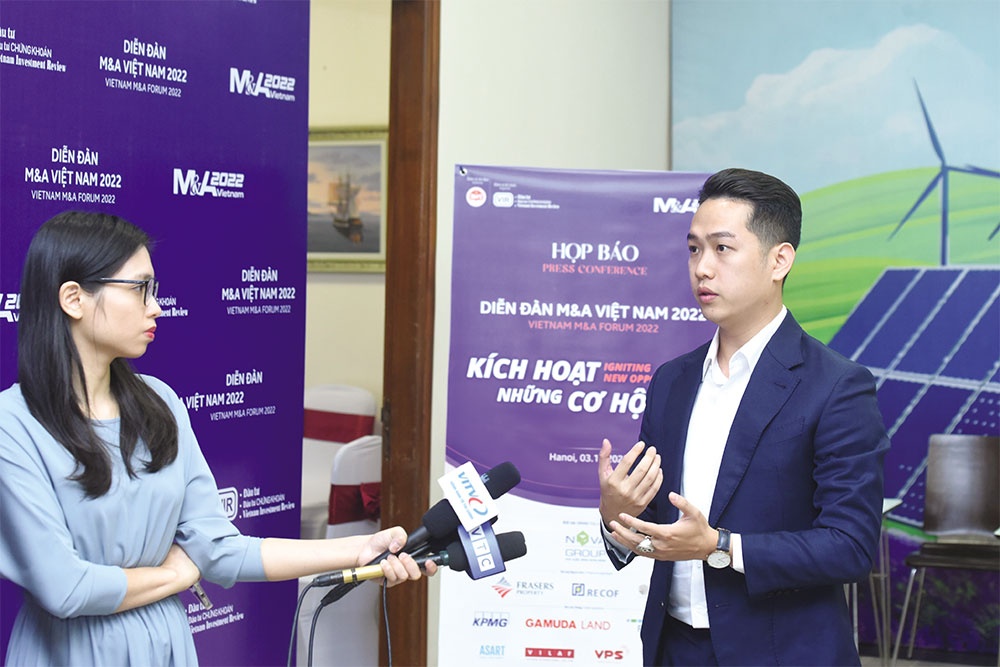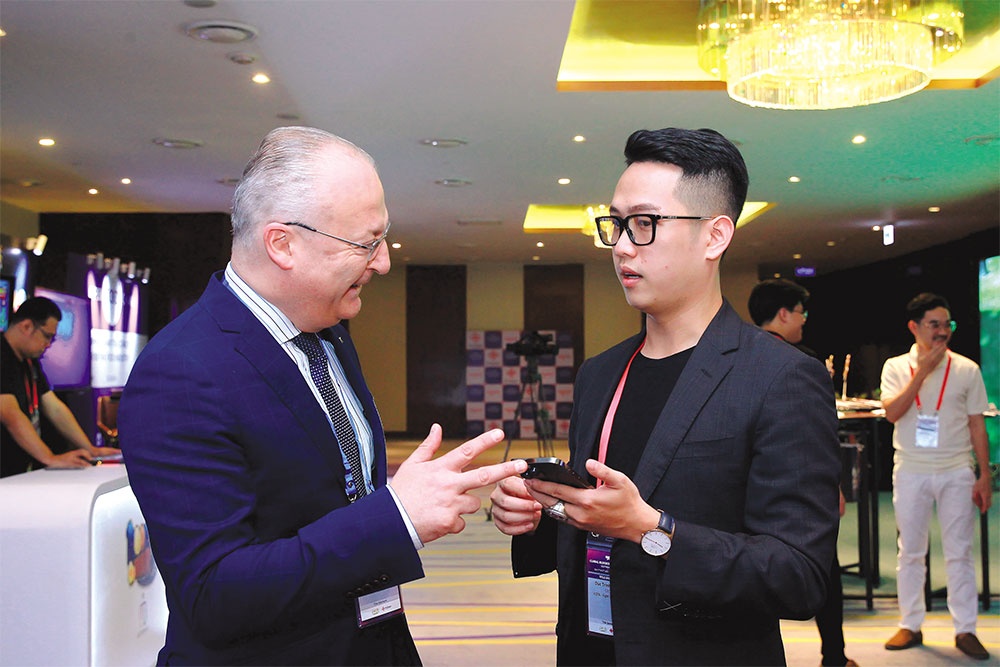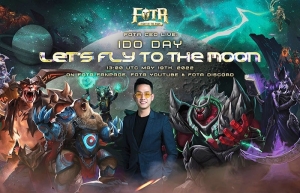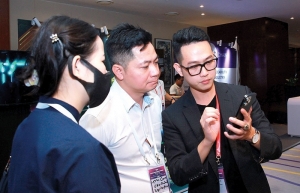Preparing for the next tech funding wave
What are the fluctuations you feel most clearly in mergers and acquisitions (M&As) in the field that D.lion partakes in?
Less than a year ago, international investors were willing to spend money to snap up projects and always wanted to be first to get to a deal. But recently, the situation is different and the seller’s position has reduced significantly.
 |
| Trinh Ngoc Duc, chairman of D.lion Holdings |
The stock, crypto, and blockchain markets have plummeted in the last six months, making investors hesitant to invest in Vietnam. One-third of the hit M&A transactions in the world are in the technology sector, while Vietnam only witnessed a handful of successful M&A transactions in the past year.
If we sell projects or business models for under $5 million, the speed of raising capital is usually only 1-2 weeks. At a cost of around $10 million, it can take a couple of months. But recently, D.lion closed a deal worth $8.3 million and it took almost double the time.
In the past, funds mainly sought to invest in the likes of blockchain and GameFi, but due to legal and financial constraints, the position of the seller and buyer in the last six months has been a lot more challenging. The reason is that the sellers always want to sell at a higher price, while buyers wish to buy cheap.
I think the most difficult thing for startups currently is waiting for the end to the so-called funding winter. In the meantime, I think sellers as well as startup project developers should focus on the products. Instead of simply waiting, they should create good products and prepare staff in preparation for a pick-up in the market
However, I still believe there will be waves at the beginning of 2023. There are individual investors who still have money left over and are keen to make some moves. Vietnam is now seeing a new wave in Industry 4.0, and many businesses are also interested in M&A in fintech and blockchain.
What criteria does D.lion base valuation on when it comes to startup projects to attract investors?
Currently, most venture capital funds are tightening their policies and facing a lack of money to survive. This means that startups have to reduce their products’ price to sell, or even sell with cheap costs. However, for D.lion’s projects, we still try to deal with an acceptable price for each investor. We believe that we always offer investors a win-win price to convince them. We never sell our projects under the market price. For us, cheap price means low-quality projects.
Evaluating a startup project should cover human resources, the business model, and a healthy financial background. I believe that we can play and win every game if we ensure those areas are all covered.
 |
For a successful deal in a newer investment field like blockchain, what are the necessary and sufficient conditions for startups to attract the attention and cooperation of investors?
To attract a decent amount of money, it is necessary to be more standardised in terms of legal, financial, and human resources. Everything is changing, from the perspective of approaching investors and projects to changes related to legislation, capital flows, and business models.
If the market gets as hot as 1-2 years ago, investors only need to figure out the trends and put their money in that direction. But back then, they did not care much about long-term financial plans and products. Projects that want to raise sufficient capital have to be quite complete in terms of products, but now also have to show investors the roadmap for subsequent rounds of funding, as well as through initial public offerings.
Project feasibility should cover 3-5 years to serve the next rounds of funding. Traditional funds in Dubai, for example, often only care about the project, and many are also willing to invest in startups with great growth potential over 2-3 years so they can then resell at high prices.
What has been D.lion’s biggest highlight for 2022?
One of D.lion’s main purposes this year has been to meet large businesses and consulting groups. We are currently implementing deals with capital flows from abroad, especially the United Arab Emirates.
It has not been easy. One of the major obstacles for smaller businesses is capital. As a result, businesses are often concerned that receiving large capital support from the M&A process may cause founders to lose control of the company and derail initial direction. Another major obstacle is the lack of professional consulting firms.
Nevertheless, progress has been made. Djinn Guild is the first and only project representing Vietnam to be selected at the MetaVestors Meet private fundraiser in Dubai, which will be organised by the Dubai Future Foundation and Metacon in the presence of top fundraisers.
From now until mid-2023, some of the current projects we are working are expected to garner the attention of new investors. However, uncertainties can be ahead and we also have to create business models that generate profits quickly. While previous projects must have money immediately, we now have to wait for the best time to put tokens into overseas cryptocurrency exchanges, for example.
How is D.lion capturing capital flows from the Middle East?
The wave of digital transformation has positively affected the entire life of businesses and individuals in that region. There are also more trends towards greening the economy and reducing carbon emissions. These trends are suitable for the taste of Dubai investors. Right now, many M&A activities in Dubai are mostly focused on fintech and digital transformation.
The middle class in the UAE is generally wealthy with traditional family funds, and they want to try new things. In fact, the UAE’s growth is not only in oil but real estate and tourism, and now they are turning to technology, blockchain, and the metaverse.
Vietnam is a leading country in terms of people involved in these areas. The amount of related projects with potential demonstrate that the nation is one of the most developed in Asia. While South Korea and Japan are very strict with processes in this area, and China more so, Vietnam in many aspects is more open. This makes the country a bright spot, although most founders and CEOs in blockchain tech are foreigners.
As for becoming more eco-friendly, Vietnam is on the clean wind power map and places like Dubai are looking to shift money to countries rich in natural resources.
 | Reaching a new stage of blockchain game funding Maintaining core values and providing transparency are top priorities for blockchain-based ventures like Fight for the Ages, as they attempt to take bigger steps in their development journey. |
 | Nurturing the next talents in blockchain Although Trinh Ngoc Duc, president of D.lion Group and CEO of Fight of the Ages, was not initially technologically savvy, he remains confident in his abilities to lead his crew to accomplish the goal of bringing a pure Vietnamese metaverse project to the world as soon as possible. |
What the stars mean:
★ Poor ★ ★ Promising ★★★ Good ★★★★ Very good ★★★★★ Exceptional
Related Contents
Latest News
More News
- Masan Consumer names new deputy CEO to drive foods and beverages growth (February 23, 2026 | 20:52)
- Myriad risks ahead, but ones Vietnam can confront (February 20, 2026 | 15:02)
- Vietnam making the leap into AI and semiconductors (February 20, 2026 | 09:37)
- Funding must be activated for semiconductor success (February 20, 2026 | 09:20)
- Resilience as new benchmark for smarter infrastructure (February 19, 2026 | 20:35)
- A golden time to shine within ASEAN (February 19, 2026 | 20:22)
- Vietnam’s pivotal year for advancing sustainability (February 19, 2026 | 08:44)
- Strengthening the core role of industry and trade (February 19, 2026 | 08:35)
- Future orientations for healthcare improvements (February 19, 2026 | 08:29)
- Infrastructure orientations suitable for a new chapter (February 19, 2026 | 08:15)

 Tag:
Tag:



















 Mobile Version
Mobile Version